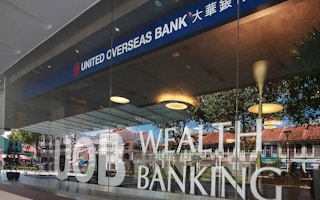Singapore’s United Overseas Bank (UOB) is to stop funding coal power projects in response to growing concern over the role finance groups play in lending to energy sources linked to climate change.
To continue reading, subscribe to Eco‑Business.
There's something for everyone. We offer a range of subscription plans.
- Access our stories and receive our Insights Weekly newsletter with the free EB Member plan.
- Unlock unlimited access to our content and archive with EB Circle.
- Publish your content with EB Premium.
The decision was announced at the bank’s annual general meeting on 26 April.
UOB is the third of Singapore’s big three banks to quit coal in an important month for sustainable finance in Southeast Asia. OCBC Bank said it would stop funding new coal-fired power stations on 15 April. DBS Bank followed two days later.
A spokesperson for UOB told Eco-Business that the bank had stopped the financing of all new coal-fired power plants since January 2018, and has “rejected all such deals that came our way over this period.”
“We do not have any new deals in the pipeline,” the spokesperson said. “We are focusing on identifying opportunities to provide financing for the development of renewable energy and to help our clients diversify into more sustainable energy sources.”
The move marks a significant change in stance from the bank, Southeast Asia’s third largest, which had previously defended its position on coal lending, saying that the fossil fuel stills play a role in supporting the region’s economic growth.
“
By taking sizeable balance sheets away from coal and contributing to climate action, this sends strong message to other banks and policy makers in this region that coal fired energy production is incompatible with sustainable development.
Jeanne Stampe, head, Asia sustainable finance, World Wide Fund for Nature
According to a report from the International Energy Agency, coal is expected to account for 40 per cent of Southeast Asia’s energy mix by 2040, as the region’s developing countries, particularly Vietnam and Indonesia, continue to bank on coal to power their fast-growing economies.
UOB was Southeast Asia’s third largest coal lender, after DBS and OCBC, data from green group Market Forces revealed last year. UOB has financed coal power deals worth $262 million over the last five years.
Singapore’s banks are the first in Southeast Asia to take a tougher stance on coal as the world’s financial services industry backs away from the fossil fuel, which is the single biggest contributor to man-made greenhouse gas emissions.
Jeanne Stampe, head, Asia sustainable finance for World Wide Fund for Nature (WWF), said she welcomed the move by Singapore’s banks to clean up their energy financing portfolios. “This is a key step towards aligning their financing portfolios with the Paris Agreement [on climate change],” she said.
“By taking sizeable balance sheets away from coal and contributing to climate action, this sends strong message to other banks and policy makers in this region that coal fired energy production is incompatible with sustainable development,” said Stampe.
The move away from coal by Singapore’s banks comes a month after a similar move by State Development & Investment Corporation (SDIC), the first major domestic Chinese financial institution to completely exit the coal industry. Japan’s Mitsubishi UFJ Financial Group (MUFG), the biggest bank in the world outside China, announced a coal exit soon after.
Financial restrictions by more than 100 institutions worldwide helped see a 20 per cent drop in newly completed coal plants in 2018, a report from Greenpeace, Global Energy Monitor, and The Sierra Club revealed in March.








